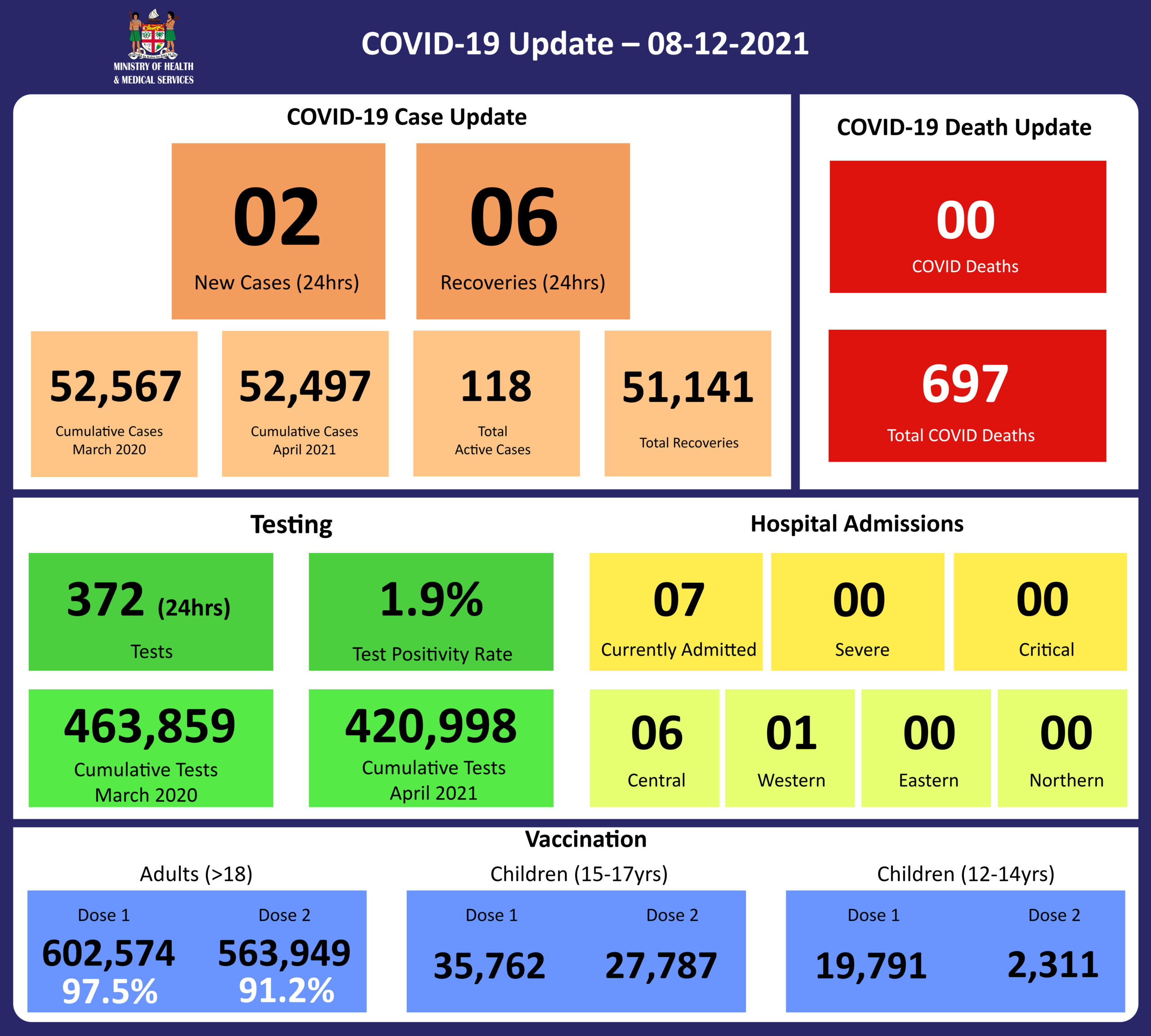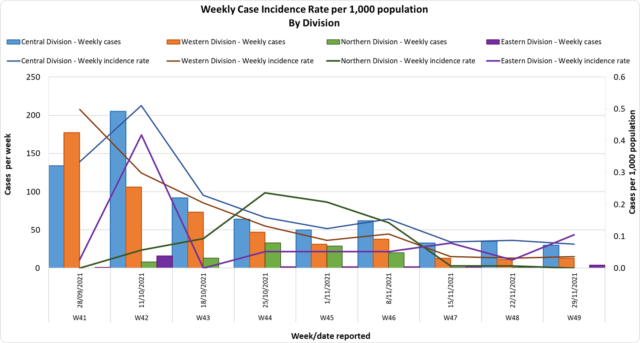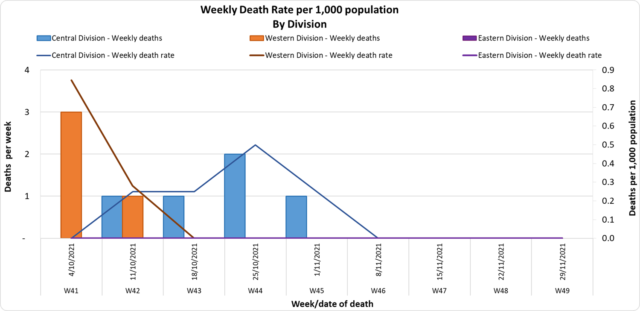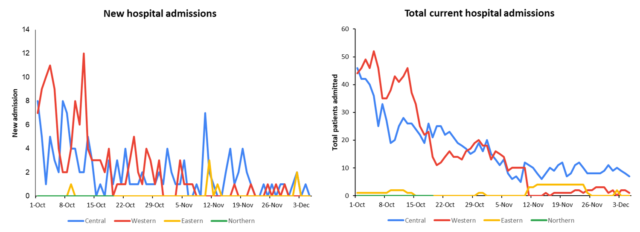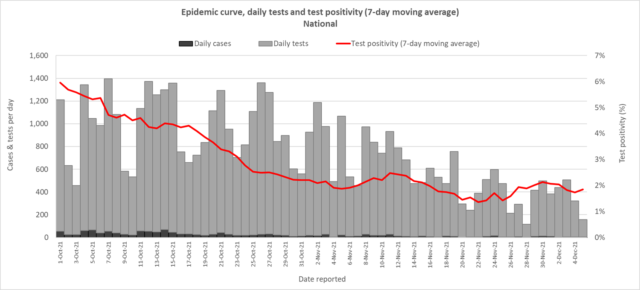Last Updated on 4 hours by Publishing Team
COVID-19 Situation Update
Wednesday, 08th December
| Transmission Update:
In the past 7 days, 16 cases were recorded in the Central division, 8 new cases in the Western division, 5 new cases in the Eastern Division, and nil new cases in the Northern Division. The Central Division cases constitute 71% of the cumulative total cases nationally, with the Western division making up 28% and 1% in the Northern and Eastern Divisions. Since the last update, we have recorded 5 new cases of which 3 new cases were recorded on 07/12/2021 and 2 new cases in the last 24 hours ending at 8 am this morning. The national 7-day rolling average of cases as of 4th December is 7 daily cases. The weekly incidence rate graph by division indicates a continually declining trend. Furthermore, the peak weekly incidence in the western division was approximately a third of that in the central division, and the cumulative case numbers are also reflecting a similar difference. |
| Deaths:
This curve depicts the weekly death rate per 1000 population by divisions since October 2021. Overall, the death rate graphs for the Central and Western Divisions indicate a declining trend. The differences between the Central and Western are similar to the incidence of the weekly cases and are likely a reflection of vaccination levels, COVID mitigation measures, and differences in population density. There is no COVID-19 death to report. There have been 697 deaths due to COVID-19 in Fiji, with 695 of these deaths during the outbreak that started in April this year. Please note that due to the time required by clinical teams to investigate, classify and report deaths, a 4-day interval is given to calculate the 7 days rolling average of deaths, based on the date of death, to help ensure the data collected is complete before the average is reported. Therefore, as of December 4th, the national 7 days rolling average for COVID-19 deaths per day is 0.0, with a case fatality rate of 1.32%. We have recorded 609 COVID-19 positive patients who died from serious medical conditions they had before they contracted COVID-19; these are not classified as COVID-19 deaths. |
| Hospitalisation:
The downward trend in both the new hospital admissions and total admissions in all hospitals admitting COVID-19 patients across the country is consistent with the cases and death trends. The hospital admissions continue on a downward trend indicating a sustained positive response to COVID mitigation measures, Population density differences, and differential Vaccination rates. |
| Testing:
372 tests have been reported for December 7th, 2021. The 7-day daily test average is 358 tests per day or 0.4 tests per 1,000 population. The national 7-day average daily test positivity is 1.9%, which is within the WHO recommendation of 5%, and this is illustrated by the lab testing graph. Though we continue testing in high-risk areas, our case numbers and test positivity rate indicate a better control of the community transmission in Fiji through the combined efforts of containment and mitigation measures with ongoing community surveillance. |
Epidemic Outlook:
The Ministry of Health continues to monitor the outbreak using indicators such as daily case numbers, hospitalizations, test positivity, and deaths.
Occupancy rates in health facilities, the occupancy rate of ICU beds, death rates, and vaccination coverage are indicators to monitor our health response capacity and we see a decreasing trend across indicators from our health facilities with increasing vaccination coverage for adults and 15-17-year-olds in Fiji. With the commencement of vaccination for 12-14-year-olds, we expect their coverage to contribute to reducing the risk of severe disease, hospitalization, and death.
With international travel open, we anticipate our testing numbers to increase from international repatriates and travelers including Fijians visiting families and friends. With increasing COVID-19 cases in the European region and the emergence of the new variant Omicron, our border health measures, and surveillance will need to be strengthened and maintained. We anticipate continued surveillance and testing in our communities and maritime islands to monitor and detect cases for early intervention.
Public Advisory:
We are aware of misinformation being peddled widely on social media. It needs to be reiterated that the evidence on Omicron variant’s impact on the transmissibility of the virus, severity of disease, and effect of prior immunity (from vaccination or infection) is still in the very early stages so conclusions cannot be made yet. However, preliminary evidence indicates that it does not make people sicker than the Delta and other strains. If anything, the direction is towards less severity. We again emphasize that this data is very early and more will be known once more people, including the most vulnerable, get infected.
Furthermore, this variant may be more transmissible than the Delta variant; it may cause reinfection in people who have been previously infected with another variant; and it has been seen to infect people who are fully vaccinated – although, so far, the fully vaccinated cases have been generally mild or with no symptoms.
The Permanent Secretary for Health and Medical Services remains extremely concerned at the lack of adherence to COVID safe measures in gatherings throughout the country, especially the adherence to masking in indoor public spaces. After the Delta outbreak this year, it is understandable that many will feel the urge to relax and celebrate now that case numbers are low, especially during the festive season. And many of us have let our guards slip. We are all human. But this must stop now if we hope to reduce the impact of the impending third wave of COVID-19 expected early in 2022.
I hope that we will all take this advice to heart and do what is right, but I have also requested all spotters from Health, Commerce, and Security Ministries to escalate the fining of individuals and corporate bodies where there is evidence of non-compliance with COVID safe measures. These spot fines must be seen as a means to promote COVID safe measures; as such, it is NOT the intention that every single transgression will be picked up and fined. All of us who live in Fiji need to understand that any large resurgence in cases is likely to undermine our social and economic recovery program, irrespective of whether it’s from the Delta variant or the entry of the Omicron variant. We now need to maintain our COVID guard and ensure we protect ourselves at all times.
Another reason for the need for community-wide COVID safe measures is that we need to create a safe environment for our children to return to school. The plan is to vaccinate as many as possible from 12 years onwards. Once school starts, we will continue our school vaccination program for all vaccine-preventable diseases. We hope to access pediatric doses of the Pfizer vaccine in the early part of the new year, however, improving vaccination in the older children and all adults in the school environment provides extra protection to children less than 12 years. Further protection is harnessed by facilitating COVID safe measures in the school and even more if there is better compliance to COVID safe measures in the community especially with regards to social gatherings.
Our mantra for “Onwards Fiji” (Toso Viti) is; protect yourself at all times to protect Fiji.

